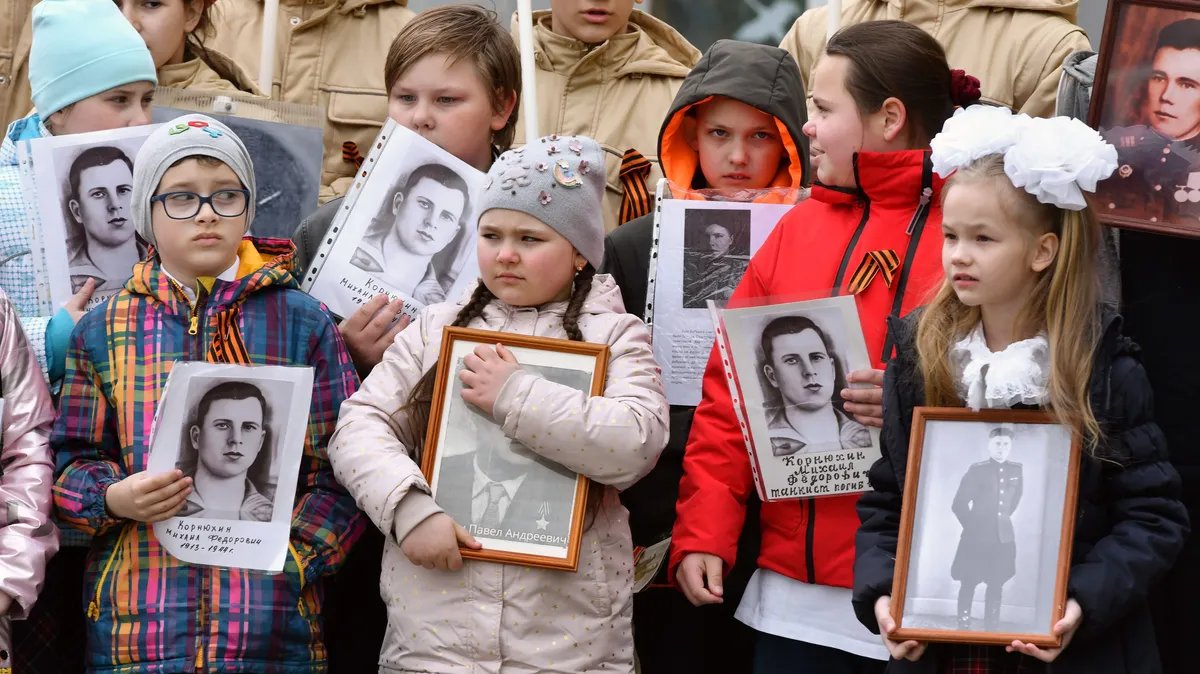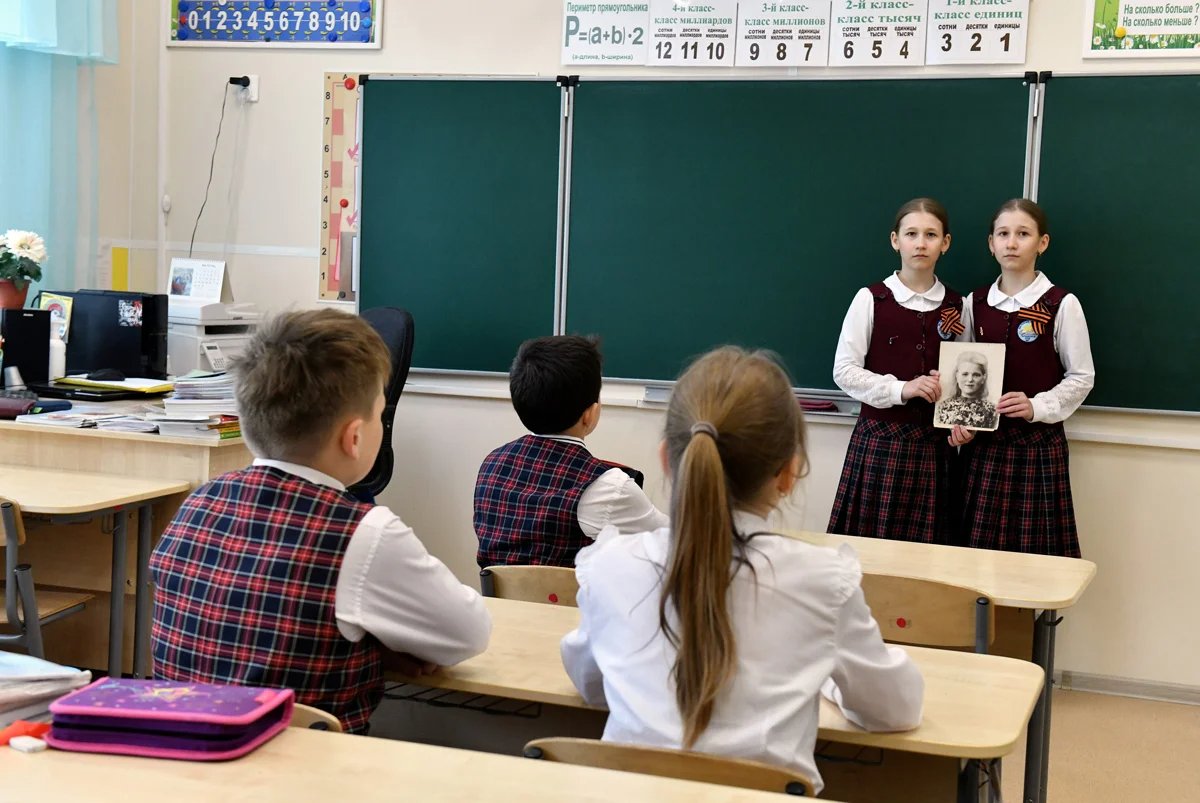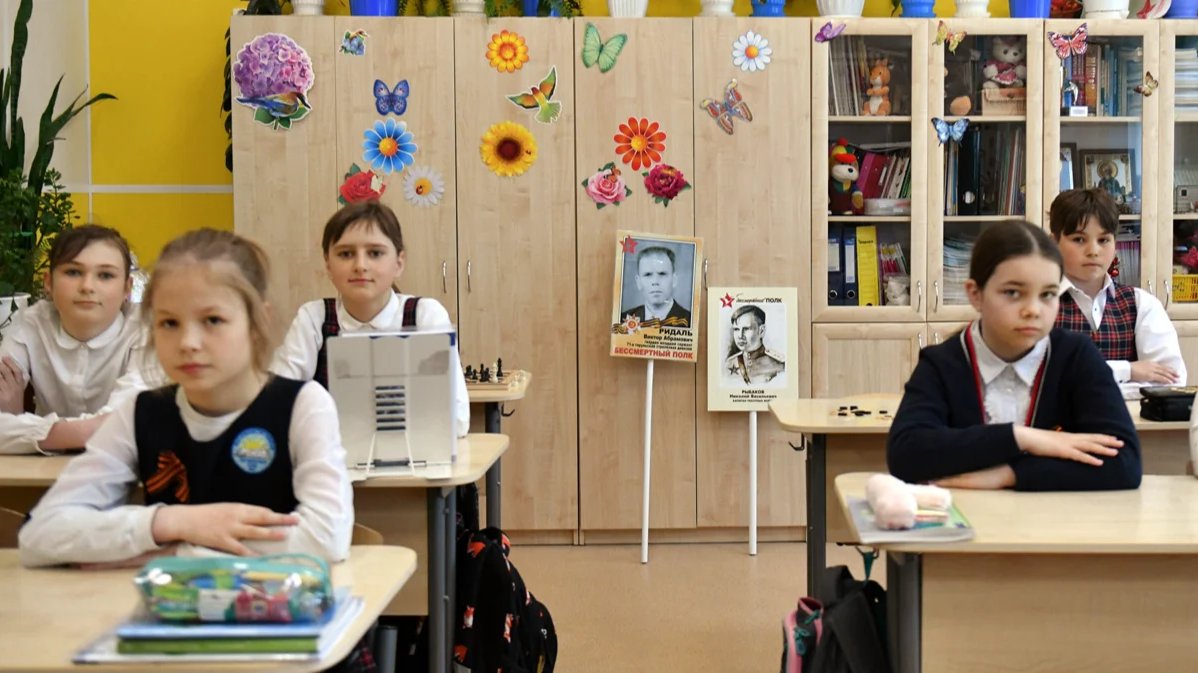In the third year of Russia’s full-scale war against Ukraine, the focus of Victory Day — 9 May, when Russia traditionally celebrates the defeat of fascism in World War II — is increasingly shifting towards the current war in Ukraine. This can clearly be seen in this year’s school guidelines issued by the Education Ministry, which encourages schools to invite a “hero of the special military operation” to speak to pupils, to hold a so-called Immortal Regiment parade to honour World War II veterans, or to write letters to soldiers at the front.
Schools were given seven activity options and were required to do at least one. Novaya Europe spoke to pupils, parents and teachers in various cities around the country and found little enthusiasm for making the “heroes of the special military operation” part of the curriculum.
For the second year in a row, the Immortal Regiment parade has been cancelled due to security concerns, though that doesn’t apply to schools and universities. According to the guidelines, educational institutions are free to choose their own memorial ceremonies. For example, pupils might share the story of a relative who took part in what the Russians refer to as the Great Patriotic War, whether as a soldier, “a partisan, a concentration camp prisoner or a survivor of the Siege of Leningrad, and bring along a portrait of them to illustrate their story.
The Immortal Regiment guidelines also recommend, among other things, referring to the experience of “participants in the special military operation”, either by inviting them along to speak or, in the case of those who died, telling their story on their behalf.
For those wanting to mark Victory Day on a larger scale, the Education Ministry proposed participating in Windows of Victory and Walls of Victory, whereby pupils and students would hang their Immortal Regiment portraits in windows and on walls and attach stories about what happened to those in the photographs.
Other proposed activities included writing letters to soldiers at the front, watching Soviet and Russian war films, putting handwritten stories about relatives who fought in World War II in a school album, visiting war memorials, and speaking to veterans.
Tomsk
Yelizaveta, a middle school pupil in the city of Tomsk, said her school had planned a solemn parade with everyone dressed in black and white, and speeches dedicated to Victory Day by middle and high school students.
“Our class isn’t taking part, though. We don’t want to,” she says.
She said Victory Day came up more often in this year’s Important Conversations classes, a recently introduced series of compulsory classes that aimed at reinforcing the government’s worldview. Her teacher did ask pupils “to bring photos of relatives and talk about them if we wanted to, but nobody was forced to. It’s sort of voluntary compulsory,” she explained. “She said it would be good if we brought stuff along.”
Yelizaveta said neither she nor her classmates were particularly interested. “It makes no difference to me. Nobody’s forcing us, thankfully. We just have to be there. My classmates are basically happy not being made to take part, because, to be honest, we’re pretty lazy and don’t want to prepare anything in advance.”

Pupils at a school parade with portraits of relatives who fought in the Great Patriotic War, Leningrad region, northwestern Russia, 4 May 2023. Photo: Andrey Bok / Kommersant / Sipa USA / Vida Press
Irkutsk
One school in the Irkutsk region held Military Appreciation Week ahead of Victory Day. The deputy head sent teachers a list of the various events planned in advance.
In late April, the pupils in grades 9-11 wrote a Victory Dictation. All children from 1st to 11th grade were asked to wear St. George ribbons, striped orange and black ribbons worn to honour Russian World War II veterans that since 2014 have become associated with nationalism. According to a teacher Novaya Europe spoke to, nobody was wearing them yet.
“It looks like everyone will only wear them on 9 May,” he said.
An Immortal Regiment event is also on the Victory Day agenda. Each class was expected to provide several photos of World War II veterans, but there were no plans to include soldiers from the war with Ukraine in the ceremony.
The school has already held the standard public speaking competition, and a Victory Songs event for primary school pupils. “They asked me to choose fewer sad songs,” the teacher says.
Kaliningrad
Yevgenia, the mother of a primary school pupil, told Novaya Europe how her daughter’s school celebrated Victory Day. The children were all given poems to learn by heart and recite in a video posted on the school’s social media.“They broke it down, with each child saying a line,” says Yevgenia. As in past years, she said the pupils sent in photos of their “grandfathers with mini-bios for an Immortal Regiment for the school museum”.
The children also performed a concert to mark the occasion, but as parents aren’t allowed onto school property, Yevgenia said she was unable to see it, though she wondered if “some active mother from the PTA got in and recorded it”.

Photo: Andrey Bok / Kommersant / Sipa USA / Vida Press
Moscow
Feofan, a high school pupil from Moscow, said that his school’s Victory Day activities would be held over several days. The school held two concerts on 30 April: one for primary school pupils and another for middle school pupils in which the children acted and recited military poems. On 3 May, it held a solemn parade in the school yard.
“There were some veterans and an old man born in 1941 who talked about fascism for a couple of minutes,” said Feofan. “And at the end of his speech he said that fascism had survived to this day.”
“To be honest, nobody was listening. Maybe the people at the front were, but my friends and I were showing each other memes.” Then, he said, the cadets carried the Victory Banner across the courtyard. “I remember someone laid carnations at the school war monument, but there was nothing interesting,” he added.
A couple of days before Victory Day, the class teacher sent a message to the class group chat suggesting everyone participate in the school’s “Let’s remember them by name!” activity, essentially an Immortal Regiment. There was no mention of “special military operation heroes”. “The main idea is to show what a great price was paid for victory in the Great Patriotic War and how many people we should be grateful to for their courage and heroism,” the teacher wrote.

